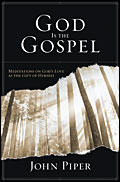Well another good day of messages. Actually one of the outstanding things was the singing of the tree hundred or so men. It actually out did the accompaniment and at the Vespers service of the choir.
In session 1 for the day Mark Devers spoke on God Centered Evangelism. There were for questions posed: 1) Who should evangelize, 2) How should we evangelize, 3) What is evangelism and 4) Why do we evangelize.
To the first question the stress was to those that may feel that evangelism is for a special class of people. So we went to Acts 8 and 11 as well as 1 Peter 3 to see verses that speak to more than just the apostles and thus show the community is involved in evangelism. TO the second question were given 6 guidelines:
1)
Do it honestly – Meaning we are not to so called soft cell but be truthful that part of the call of God is to take up ones cross.
2)
Tell people with urgency – Since the Bible tells that there is no other way then there truly is little to think about. But also passages such as Psalm 95 speak of an urgency of the message of the Gospel.
3)
Tell people with joy – The Gospel is good news because it allows us to see God. This is not a fact of purporting all of the blessings but instead allowing people to see the joy in simply knowing God. So as to see the truth of Heb 11 and that we can endure all for the joy set before us.
4)
Use the Bible – This is not because people trust the Bible but what it does do is show that it is not your opinion but comes from a particular source.
5)
Our lives are to be a central point of the evangelism – The beauty of God is to be displayed in His people and thus is part of evangelism.
6)
Prayer – We need to implore God for salvation since it is God who calls and saves.
One important aspect that was related was that we need to avoid relating sin to helplessness since many people may not get the right connection and instead of dealing with their sin simply seek to eliminate their feelings of helplessness. So their response may not be genuine.
Another question dealt with was :
Why should we evangelize?.1) Desire to be obedient
2) Having a love for the lost
3) Having love for God – our only sufficient motive is to see God glorified
So we have a God given commission, a God Given Method, a God Given Message and a God Given Motive.
Session two was by RC on God Centered Adult Education with the focus scripture being Hosea 4:1-12. After he started giving a list that was antithetical to what most would see as true it was revealed that he was joking. I quit writing because I wondered where he was going. The basic idea is to teach so that the people can be obedient. Needs may be met but that is not the focus just as the benefits of the Gospel are not to be the focus. We can not guarantee results as we do not know the will of God. The bottom line was to help adults so that they can have knowledge but knowledge for knowledge sake.
Session three was by Derek Thomas and was on God Centered Mercy Ministry and he used Acts 6:1-7 as the focus passage. While it is important to minister outside the church we do need to make sure that mercy ministry starts in the household of God. This was not to detract from outside ministry but was so as not to ignore internal ministry. The struggle I can see is making sure that the church does not become cloistered in its own little corner. Two observations were given with the first being that the Churches greatest need and priority is the proclamation of the Gospel so as to nourish and stabilize. The second observation was, as I said above, that Mercy Ministry begins in the household of God.
The day ended with a Vespers service. I need to look up what Vespers is as far as a definition. Basically it was a more formal Wednesday night service. The message was from Galatians 4:1-7 and was very good.
This has been a great conference and not only a help with the messages but also very encouraging talking to all of the other pastors that were here from various denominations. So again thanks to those that helped me come and my wife for letting me go.
So tomorrow it off to home and since I leave the Hotel at Noon (9am PST) and get home at 10:50 PM (PST) it is going to be a long day.







.gif)







